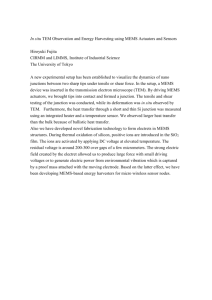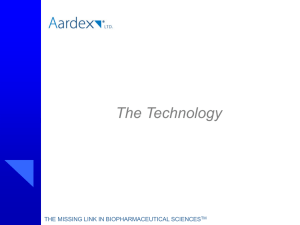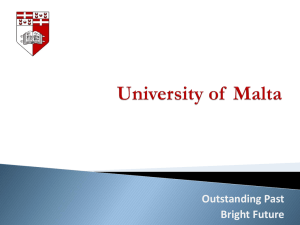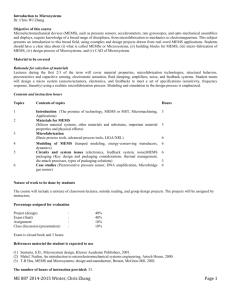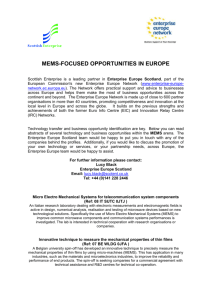Title: MEMS Design and INTEGRAM Prototyping Services
advertisement
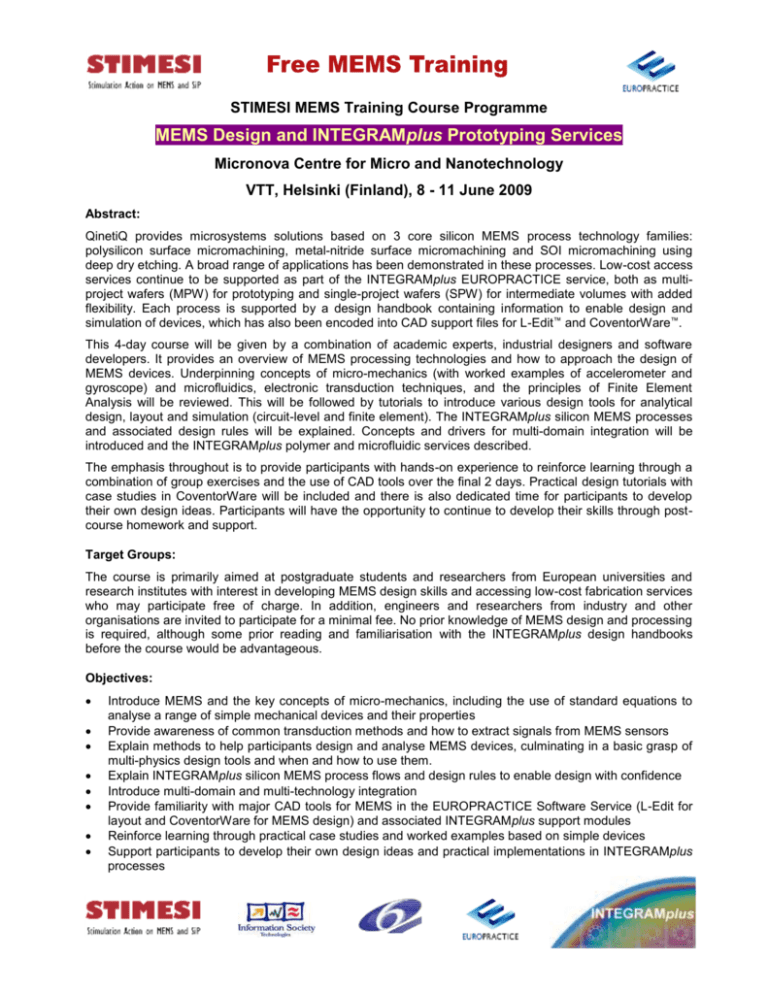
STIMESI MEMS Training Course Programme MEMS Design and INTEGRAMplus Prototyping Services Micronova Centre for Micro and Nanotechnology VTT, Helsinki (Finland), 8 - 11 June 2009 Abstract: QinetiQ provides microsystems solutions based on 3 core silicon MEMS process technology families: polysilicon surface micromachining, metal-nitride surface micromachining and SOI micromachining using deep dry etching. A broad range of applications has been demonstrated in these processes. Low-cost access services continue to be supported as part of the INTEGRAMplus EUROPRACTICE service, both as multiproject wafers (MPW) for prototyping and single-project wafers (SPW) for intermediate volumes with added flexibility. Each process is supported by a design handbook containing information to enable design and simulation of devices, which has also been encoded into CAD support files for L-Edit™ and CoventorWare™. This 4-day course will be given by a combination of academic experts, industrial designers and software developers. It provides an overview of MEMS processing technologies and how to approach the design of MEMS devices. Underpinning concepts of micro-mechanics (with worked examples of accelerometer and gyroscope) and microfluidics, electronic transduction techniques, and the principles of Finite Element Analysis will be reviewed. This will be followed by tutorials to introduce various design tools for analytical design, layout and simulation (circuit-level and finite element). The INTEGRAMplus silicon MEMS processes and associated design rules will be explained. Concepts and drivers for multi-domain integration will be introduced and the INTEGRAMplus polymer and microfluidic services described. The emphasis throughout is to provide participants with hands-on experience to reinforce learning through a combination of group exercises and the use of CAD tools over the final 2 days. Practical design tutorials with case studies in CoventorWare will be included and there is also dedicated time for participants to develop their own design ideas. Participants will have the opportunity to continue to develop their skills through postcourse homework and support. Target Groups: The course is primarily aimed at postgraduate students and researchers from European universities and research institutes with interest in developing MEMS design skills and accessing low-cost fabrication services who may participate free of charge. In addition, engineers and researchers from industry and other organisations are invited to participate for a minimal fee. No prior knowledge of MEMS design and processing is required, although some prior reading and familiarisation with the INTEGRAMplus design handbooks before the course would be advantageous. Objectives: Introduce MEMS and the key concepts of micro-mechanics, including the use of standard equations to analyse a range of simple mechanical devices and their properties Provide awareness of common transduction methods and how to extract signals from MEMS sensors Explain methods to help participants design and analyse MEMS devices, culminating in a basic grasp of multi-physics design tools and when and how to use them. Explain INTEGRAMplus silicon MEMS process flows and design rules to enable design with confidence Introduce multi-domain and multi-technology integration Provide familiarity with major CAD tools for MEMS in the EUROPRACTICE Software Service (L-Edit for layout and CoventorWare for MEMS design) and associated INTEGRAMplus support modules Reinforce learning through practical case studies and worked examples based on simple devices Support participants to develop their own design ideas and practical implementations in INTEGRAMplus processes Topics: Day 1: Introduction to MEMS • • • • MEMS Fabrication Basics Micromechanics Basics Analytical Design Examples INTEGRAMplus Silicon MEMS Fabrication Services and Design Kits • • Days 3-4: CAD tools for MEMS • • Day 2: Introduction to Design • • • • Transduction Basics Introduction to Design – Design methodology – Finite element analysis – Circuit and system modelling Finite Element and P-Spice Examples Fundamentals of Microfluidics INTEGRAMplus Microfluidic Services Multi-domain and Multi-technology Integration • Introduction to Layout in L-Edit – practical layout and design rule exercises Accelerometer and/or resonator-based tutorials in CoventorWare: – circuit-level simulation with parameterised libraries (MEMS and MEMS + electronics) – solid model generation – finite element analysis – statistical yield prediction Freeform design session with trainer support Each course is limited to 18 participants to ensure a high quality of training. Please reserve your place early to avoid disappointment. STIMESI INTEGRAMplus design courses run approximately every 6 months and move around different locations within Europe. What is STIMESI? The goal of the STIMESI Training Action is to stimulate European universities and research institutes to adopt MEMS and SiP technologies. The more experienced universities already active in MEMS design/technology will be assisted to increase their MEMS research activities and to design and fabricate more MEMS circuits and SiP components. Additionally other universities not currently active in this area will be given guidance to help them reinforce their MEMS / SiP teaching and research activities. Who should attend? All EUROPRACTICE member universities and research institutes that want to begin or strengthen their teaching and/or research activities in MEMS / SiP technologies. Also companies having interest in using MEMS in future products are invited to attend. For more information, please visit the following links: www.STIMESI.org www.EUROPRACTICE.com www.INTEGRAMplus.com This course is being organised by QinetiQ Ltd with local co-ordination by VTT and registration via the STIMESI project office at the Rutherford Appleton Laboratory (RAL) www.QinetiQ.com/MEMS http://www.micronova.fi/ http://www.stimesi.rl.ac.uk/index.cfm Future Venues Other courses are planned to be held in Lisbon, Portugal (16-19 March 2009) and Edinburgh, Scotland (2629 October 2009). Location: The course will be held at the Micronova Centre for Micro and Nanotechnology, located at the VTT Technical Research Centre of Finland and Helsinki University of Technology on the Otaniemi Technology Campus, 8 11 June 2009, http://www.otaniemi.fi/portal/explore_otaniemi/ A joining pack will be sent to registrants containing details of the course location, schedule and suggested local accommodation upon registration. Participants will need to make their own accommodation and travel arrangements. Fees: • Attendance is free for members of universities and research centres from all 27 EU countries and Norway, Iceland, Lichtenstein, Israel, Croatia, Switzerland and Turkey. In case the course is oversubscribed, access may be limited to one participant per institute and will be on a first-come basis. • Companies and other organisations: 300 € (excl. 21% VAT) • Fee includes all lectures, course materials, lunches and refreshment breaks. Accommodation, transport and other meals are not included in the course fee. • Cancellation by a participant between 2 and 28 days before the start of the course is subject to a 200 € administration fee. A 300 € fee will be charged for cancellation within 48 hours of the start of the course or for those who do not attend. REGISTRATION As our service is continuously improving, we ask you to register through our online booking system rather than faxing the paper registration form. The following link brings you there : http://www.stimesi.rl.ac.uk Browse to the STIMESI Course Booking System, select the “INTEGRAMplus” course and use the “Book This Course” link: NOTES: The STIMESI Course Booking System is managed and maintained by STFC Rutherford Appleton Laboratory. All enquires should be emailed to: stimesi@rl.ac.uk
